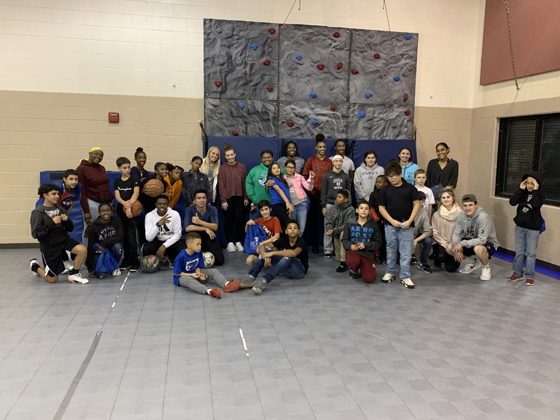Community Ambassadors Program Introduced by Professor Terry Scott

Professor Terry Scott started a program at Hood to connect student mentors with youth mentees.
Community Ambassadors Program
Terry Scott, Ph.D., associate professor of American history, started the Community Ambassadors Program in the fall 2017, which is designed to guide and encourage local middle and high school students from economically marginalized communities. The course focuses on the intersection of sports and community uplift with an emphasis on how athletics can impact adolescents today.
In this program, Hood students connect with local youth in a group mentoring setting. The program’s focus is on the historic role of athletics in underserved communities, as well as how athletics can engage youth and be a vehicle for social change.
“I started this program at the University of Washington to reach those kids who are largely marginalized economically and to make them college ready and college bound,” said Scott. “I started the program there for student-athletes who didn’t have a lot of internship opportunities because of schedules.”
Students who are interested in the program at Hood register as with any other class on Self Service. Scott looks for Hood students who are consistent and committed to helping the youth in the program.
“Before the program officially started, students took part in a three-week series of discussions involving public speaking and mentoring,” said Scott. “They also exchanged ideas about activities that Hood students and the middle and high school students could do together.”
The course is open to all Hood College students who want to hone their leadership and time-management skills and have a desire to help middle and high school youth reach their full potential.
“The Community Ambassadors meet weekly in the athletic center with their mentees to discuss such topics as college preparedness, handling pressures at home, confidence building and goal setting,” said Scott.
Students will eventually lead their own discussions and activities with the youth with less guidance from the program directors. First-year student Levi Davis discussed his journey in the program.
“Being a mentor or becoming a mentor has its challenges, but is an exciting process to understand a mentee and to have that connection with them,” Davis said. “During the first week of mentoring, I knew that the first impression was going to be everything to mentees and to the mentors. As we began planning for the mentees to have a fun time with us, I felt unsure about the activities and nervous that I and the other mentors wouldn’t be able to connect to the mentees.”
Davis was able to ease his nervousness when he realized that most of the mentees were outgoing and enjoyed the activities that were planned, which included creating slime, making sand art, and playing knock out and soccer. During the second week of mentoring, Davis and his partner, Keith Claiborne, were more prepared with activities for the students.
“Understanding who you are, and your worth is important,” said Davis. The game “Blank Paper Traits” taught this lesson. The objective of the game was for the students to follow the direction of Davis and Claiborne, with their eyes closed, while folding and tearing the corners of the paper they were given. All of them folded and tore the paper a different way.
“This activity teaches the mentees more about themselves while also teaching them how everyone is different in their own way. After the lesson, I got a lot of positive feedback,” said Davis.
Hood junior Kiara Brown expressed similar thoughts to her experience for the ambassador’s program.
“My experience has been great! I was drawn to the program because growing up, I was in a similar program. The mentors there would help with homework and do activities with me. My mom worked multiple jobs and would get home late, so the mentors would help in ways she couldn’t.”
The ambassador program was cut short in the spring due to COVID-19, but Brown was hoping to create vision boards with the students. This program will continue in fall 2021.
Contact Terry Scott at scottt@hood.edu for more information.
Are you ready to say Hello?
Choose a Pathway
Information will vary based on program level. Select a path to find the information you're looking for!
